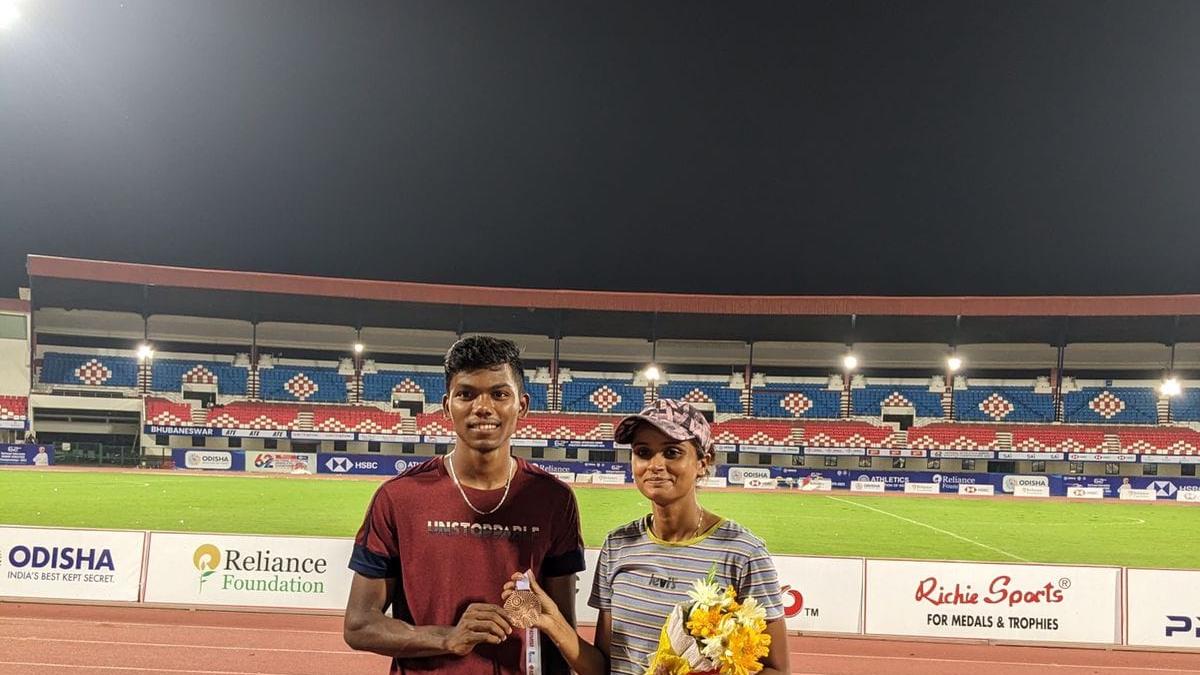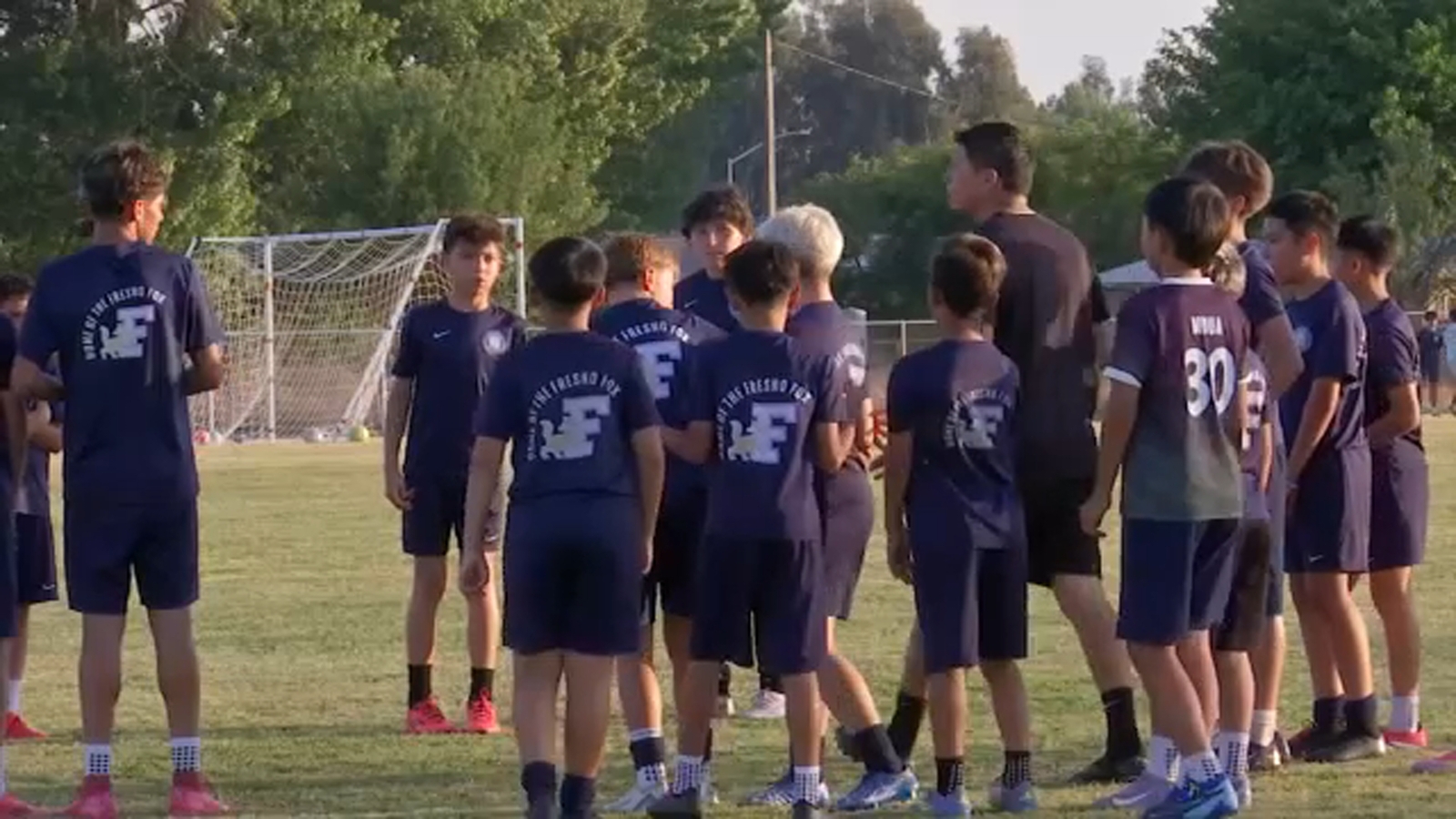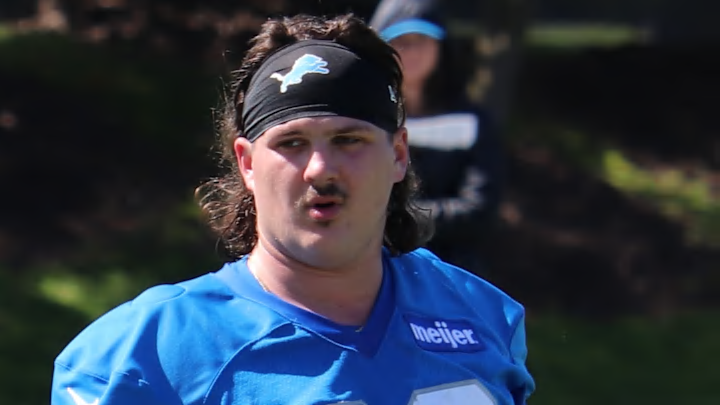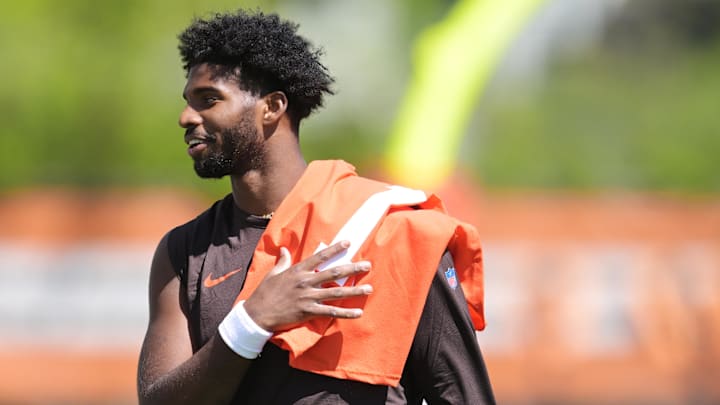On Tuesday evening at Kochi’s Maharaja College Stadium, an official spotted what he thought was a young woman athlete wandering around the sidelines of the men’s long jump competition. When he tried to shoo her away, one of the competitors, P David, intervened. “She’s my coach!” Only then was Keerti Tiwari allowed to sit in the coaches’ box next to the long jump runway.
While the official may have been overzealous, the truth is that, at just 32 and with a sprinter’s build, Keerti doesn’t fit the typical image of an athletics coach — someone usually a decade older and almost exclusively male. Keerti was the only female coach on the sidelines of any competition at the Federation Cup. “This happens all the time.

I think I’m used to it. People see someone who looks like me and think she can’t be a coach,” Keerti later told Sportstar. Keerti isn’t your average coach in more ways than one.
She is currently one of the best jumps coaches in India. On Tuesday, 23-year-old David, who vouches for her credentials, equalled his personal best of 7.94m to win gold in the men’s long jump, surpassing more renowned athletes, including National Record holder and Olympian Jeswin Aldrin.
While the result was impressive, Keerti isn’t satisfied. “David jumped 7.94m in 2023 and had an 8.
05m jump at a State meet as well. I think he can jump over 8.20m.
He would have already reached that level, but he had bad hamstring injuries last year. He’s just getting back to his full potential, and things haven’t clicked yet, but I’m sure he’ll get there,” she says. On Tuesday, 23-year-old David, who vouches for her credentials, equalled his personal best of 7.
94m to win gold in the men’s long jump, surpassing more renowned athletes, including National Record holder and Olympian Jeswin Aldrin. | Photo Credit: Special Arrangement Keerti has believed in David’s potential since she started coaching him three years ago. At that time, he was a mid-level jumper with a personal best of 7.
45m, recovering from an injury sustained while training with a senior foreign coach at the Sports Authority of India (SAI) centre in Bangalore. “It was only after he got injured that he was moved to the development group under me. Back then, he wasn’t very serious.
He didn’t believe he could be an 8m jumper. But I told him that if he set small goals, he wouldn’t go far. He had to dream big.
He needed to believe that he was meant for greater things and that he had to fight for them,” Keerti recalls. When she talks about fighting for bigger things, Keerti could just as easily be describing her journey into the elite circles of Indian sports coaching. ALSO READ | On the brink of breaking PT Usha’s 41-year-old record, Vithya Ramraj looking well beyond There are very few women coaches in Indian sports.
An RTI inquiry filed by this reporter after the Tokyo Olympics revealed that only about 1 in 10 coaches at SAI centres are women. At the highest levels, those numbers are even more skewed. In athletics, except for former Soviet sprinter Galina Bukharina, who led India’s 400m program a few years ago, there have been no women coaches at the top level.
Although Keerti didn’t initially set out to be a coach, her interest in sports was always strong. “My father worked at the collectorate office, and for him, the priority was studying. My brother did just that and cleared the civil service exams! But I was good at school-level sports competitions, and I wanted to do more.
I pleaded and bargained with them to let me be a sportsperson,” she says. She managed to convince her parents to let her study at Gwalior’s LNIP (Lakshmibai National Institute of Physical Education), citing the institution’s history of producing recruits for the armed forces as a reason for her interest. Once there, however, Keerti threw herself into sports.
Despite her passion, she soon realised that her potential as an athlete had limits. “I had a personal best of around 57 seconds in the 400m. I participated in the National University Games but didn’t place.
I knew I couldn’t become a professional athlete, but I still wanted to be connected to sports in some way,” she says. That path led her to coaching. Keerti completed her B.
Ped and M.Ped degrees, the latter with a minor in sports psychology from LNIP, and then did her diploma in coaching from the National Institute of Sports in Patiala. Her first coaching stint was in Lucknow in 2019.
“I wanted to coach sprints because I had been a 400m runner myself. But when I started, I had no 400m runners to coach. However, there was one boy who was a high jumper, so that’s how I got started,” she says.
She got that jumper to 2.05m, qualifying for the Asian Youth Championships, a result that earned her a position at the SAI centre in Bengaluru. There, she was assigned to work with junior athletes.
While working with the development group wasn’t as prestigious as coaching senior athletes, Keerti made the most of the opportunity. David is her most recent national champion, but last month, another of her athletes, 17-year-old Shahnawaz, won gold at the National Games in Uttarakhand, while P Arya won gold at the Open National Championships last year. The Lone Woman in a Man’s World At all these competitions, Keerti is aware that she’s often the only woman coach present.
She admits it took some time to adjust. “When I first started accompanying athletes to competitions, I realised that there wasn’t a single other female jumps coach. I used to feel nervous.
But I forced myself to stand strong and not show any sign of anxiety. I did that because my athlete is looking to me for support. If they see that I am uncomfortable, it affects them as well.
My athletes are my priority,” she says. Despite her efforts to improve the athletes she’s assigned, she admits it’s often been difficult to find a space where she feels truly included as a coach. “SAI Bengaluru has been very supportive, and a few coaches have looked out for me, but many discouraged me when I started.
They’d tell me that coaching is a technical field and only men can handle it. But the most important thing is to have a creative mind. At other times, people would ask, ‘Tum ghar kyo nahi sambhal rahe ho?’ (Why aren’t you taking care of your family?).
They think I’m a woman, so the most important thing is to get married and have a family. I’d hear this at least twice a day when I started. Even now, I hear it occasionally,” she says.
Rather than letting these taunts discourage her, Keerti uses them as motivation. “When I entered coaching, I knew I had to work harder than others, not just because I’m a woman, but because I don’t have the tag of being an Olympian or an Asian medallist. Many athletes have that privilege, but I have to prove myself with results.
My day starts at 5:30 am, preparing for the training session. The session starts at 7 am, and from then on, I’m almost continuously on my feet. My training day usually ends around 7:30 pm, but I still have to handle office work and prepare for the next day.
My day typically ends around 10:30 pm. Some days it gets tough, especially when I have to go home and cook for myself at the end of it all,” she admits. Though there are good days, like when she watched David win his first senior gold, there are also more challenging ones.
“The hardest part of coaching, I think, is that you have to disconnect from your personal life. There are no holidays or days off. I haven’t gone home for Diwali in the last two years.
I try to call my parents every night and make it a point to go home for a few days at the end of the competition season. Sometimes they’ll ask when I’m planning to get married, but I usually send them gifts to change their mind. They don’t completely understand sports, but they support me as much as they can,” she says.
Being a single woman in a male-dominated field has forced Keerti to adapt in other ways. “It’s difficult as a woman coach because you can’t make many friends the higher you go. There are so few women in this field, and you don’t want to create an image that you are too friendly.
Initially, I was very smiley and greeted everyone. When I did that, people used to think they didn’t have to take me seriously. So I had to switch and show a bit of harshness to get things done,” she explains.
The Hardest Days Keerti admits there are times when everything — the negativity, hard work, and loneliness — catches up with her. “The thing I miss most is eating with my mother. I wasn’t used to eating alone before I became a coach.
I think many women start out in coaching, but once they face all these challenges, they leave the profession or take a step back. There are days when things get really bad, and I go back to my room and cry. But the next day, I come back ready to go again.
I’ve sacrificed so much to get here. There’s no reason to quit now. If there’s one thing I am, it’s ziddi (persistent).
I love what I do. I will work as hard as I need to be a coach. If there’s one thing I’m devoted to, it’s making my athletes better,” she says.
The one place where Keerti feels she can truly be herself is on the training field. “I have a very serious reputation in general, but I’m very different with my athletes. I can be my normal, fun, and jolly self with them,” she says.
“Some coaches want their athletes to fear them, but I think my personality gives me an edge. You don’t want your athlete to feel restricted around you. If they do, they might hold back.
I see coaching as a partnership. I want my athletes to feel open with me, and they help me improve, too,” she adds. Keerti knows that for her and her athletes to achieve anything, they must work as a team.
Like she told David at the start of their journey, his dreams had to be big. On her whiteboard in Bengaluru, just above the countdown to major competitions, is a poster with the affirmation: “I am an Olympic coach.” Keerti has kept that poster up for years now.
“Once a senior coach asked me, ‘What are you doing all this for? Do you think you’re going to the Olympics?’ Normally, I’m used to people underestimating me, so I usually just ignore it. But that time, I said, ‘Yes! I’m going to take an athlete to the Olympics,’” she says. Keerti wants to achieve this not just for herself, but also to prove that people like her belong in this field.
“Even though I’ve produced a number of national champions, people still don’t think it’s anything special. If things have to change, we have to do something extraordinary. My athletes and I will do it,” she says.
Comments Related Topics Federation Cup / SAI / Galina Bukharina Latest on Sportstar.
Sports

Giant leap for women coaches: Behind India’s latest long jump champ is 32-year-old Keerti Tiwari

Often mistaken for an athlete, Keerti is one of India’s youngest and few female coaches at the highest levels of Indian sport. P David, who claimed gold in the men’s long jump at the Federation Cup, is her third senior national champion.















